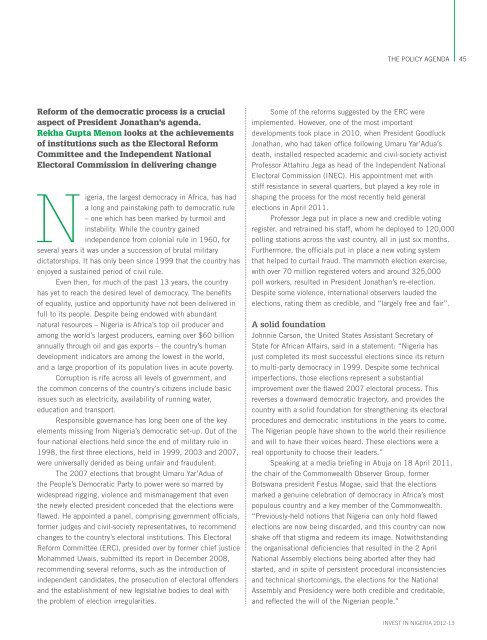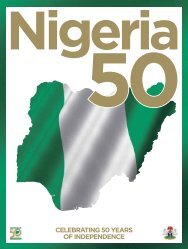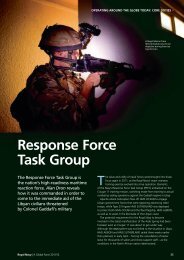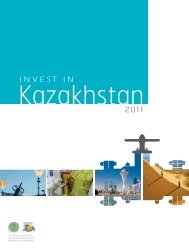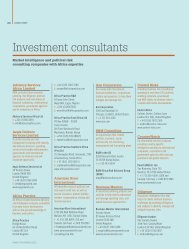NIGERIA Invest in 2012-13 - Newsdesk Media
NIGERIA Invest in 2012-13 - Newsdesk Media
NIGERIA Invest in 2012-13 - Newsdesk Media
Create successful ePaper yourself
Turn your PDF publications into a flip-book with our unique Google optimized e-Paper software.
Reform of the democratic process is a crucial<br />
aspect of President Jonathan’s agenda.<br />
Rekha Gupta Menon looks at the achievements<br />
of <strong>in</strong>stitutions such as the Electoral Reform<br />
Committee and the Independent National<br />
Electoral Commission <strong>in</strong> deliver<strong>in</strong>g change<br />
Nigeria, the largest democracy <strong>in</strong> Africa, has had<br />
a long and pa<strong>in</strong>stak<strong>in</strong>g path to democratic rule<br />
– one which has been marked by turmoil and<br />
<strong>in</strong>stability. While the country ga<strong>in</strong>ed<br />
<strong>in</strong>dependence from colonial rule <strong>in</strong> 1960, for<br />
several years it was under a succession of brutal military<br />
dictatorships. It has only been s<strong>in</strong>ce 1999 that the country has<br />
enjoyed a susta<strong>in</strong>ed period of civil rule.<br />
Even then, for much of the past <strong>13</strong> years, the country<br />
has yet to reach the desired level of democracy. The benefits<br />
of equality, justice and opportunity have not been delivered <strong>in</strong><br />
full to its people. Despite be<strong>in</strong>g endowed with abundant<br />
natural resources – Nigeria is Africa’s top oil producer and<br />
among the world’s largest producers, earn<strong>in</strong>g over $60 billion<br />
annually through oil and gas exports – the country’s human<br />
development <strong>in</strong>dicators are among the lowest <strong>in</strong> the world,<br />
and a large proportion of its population lives <strong>in</strong> acute poverty.<br />
Corruption is rife across all levels of government, and<br />
the common concerns of the country’s citizens <strong>in</strong>clude basic<br />
issues such as electricity, availability of runn<strong>in</strong>g water,<br />
education and transport.<br />
Responsible governance has long been one of the key<br />
elements miss<strong>in</strong>g from Nigeria’s democratic set-up. Out of the<br />
four national elections held s<strong>in</strong>ce the end of military rule <strong>in</strong><br />
1998, the first three elections, held <strong>in</strong> 1999, 2003 and 2007,<br />
were universally derided as be<strong>in</strong>g unfair and fraudulent.<br />
The 2007 elections that brought Umaru Yar’Adua of<br />
the People’s Democratic Party to power were so marred by<br />
widespread rigg<strong>in</strong>g, violence and mismanagement that even<br />
the newly elected president conceded that the elections were<br />
flawed. He appo<strong>in</strong>ted a panel, compris<strong>in</strong>g government officials,<br />
former judges and civil-society representatives, to recommend<br />
changes to the country’s electoral <strong>in</strong>stitutions. This Electoral<br />
Reform Committee (ERC), presided over by former chief justice<br />
Mohammed Uwais, submitted its report <strong>in</strong> December 2008,<br />
recommend<strong>in</strong>g several reforms, such as the <strong>in</strong>troduction of<br />
<strong>in</strong>dependent candidates, the prosecution of electoral offenders<br />
and the establishment of new legislative bodies to deal with<br />
the problem of election irregularities.<br />
the policy agenda 45<br />
Some of the reforms suggested by the ERC were<br />
implemented. However, one of the most important<br />
developments took place <strong>in</strong> 2010, when President Goodluck<br />
Jonathan, who had taken office follow<strong>in</strong>g Umaru Yar’Adua’s<br />
death, <strong>in</strong>stalled respected academic and civil-society activist<br />
Professor Attahiru Jega as head of the Independent National<br />
Electoral Commission (INEC). His appo<strong>in</strong>tment met with<br />
stiff resistance <strong>in</strong> several quarters, but played a key role <strong>in</strong><br />
shap<strong>in</strong>g the process for the most recently held general<br />
elections <strong>in</strong> April 2011.<br />
Professor Jega put <strong>in</strong> place a new and credible vot<strong>in</strong>g<br />
register, and retra<strong>in</strong>ed his staff, whom he deployed to 120,000<br />
poll<strong>in</strong>g stations across the vast country, all <strong>in</strong> just six months.<br />
Furthermore, the officials put <strong>in</strong> place a new vot<strong>in</strong>g system<br />
that helped to curtail fraud. The mammoth election exercise,<br />
with over 70 million registered voters and around 325,000<br />
poll workers, resulted <strong>in</strong> President Jonathan’s re-election.<br />
Despite some violence, <strong>in</strong>ternational observers lauded the<br />
elections, rat<strong>in</strong>g them as credible, and “largely free and fair”.<br />
A solid foundation<br />
Johnnie Carson, the United States Assistant Secretary of<br />
State for African Affairs, said <strong>in</strong> a statement: “Nigeria has<br />
just completed its most successful elections s<strong>in</strong>ce its return<br />
to multi-party democracy <strong>in</strong> 1999. Despite some technical<br />
imperfections, those elections represent a substantial<br />
improvement over the flawed 2007 electoral process. This<br />
reverses a downward democratic trajectory, and provides the<br />
country with a solid foundation for strengthen<strong>in</strong>g its electoral<br />
procedures and democratic <strong>in</strong>stitutions <strong>in</strong> the years to come.<br />
The Nigerian people have shown to the world their resilience<br />
and will to have their voices heard. These elections were a<br />
real opportunity to choose their leaders.”<br />
Speak<strong>in</strong>g at a media brief<strong>in</strong>g <strong>in</strong> Abuja on 18 April 2011,<br />
the chair of the Commonwealth Observer Group, former<br />
Botswana president Festus Mogae, said that the elections<br />
marked a genu<strong>in</strong>e celebration of democracy <strong>in</strong> Africa’s most<br />
populous country and a key member of the Commonwealth.<br />
“Previously-held notions that Nigeria can only hold flawed<br />
elections are now be<strong>in</strong>g discarded, and this country can now<br />
shake off that stigma and redeem its image. Notwithstand<strong>in</strong>g<br />
the organisational deficiencies that resulted <strong>in</strong> the 2 April<br />
National Assembly elections be<strong>in</strong>g aborted after they had<br />
started, and <strong>in</strong> spite of persistent procedural <strong>in</strong>consistencies<br />
and technical shortcom<strong>in</strong>gs, the elections for the National<br />
Assembly and Presidency were both credible and creditable,<br />
and reflected the will of the Nigerian people.”<br />
<strong>in</strong>vest <strong>in</strong> nigeRia <strong>2012</strong>-<strong>13</strong>


